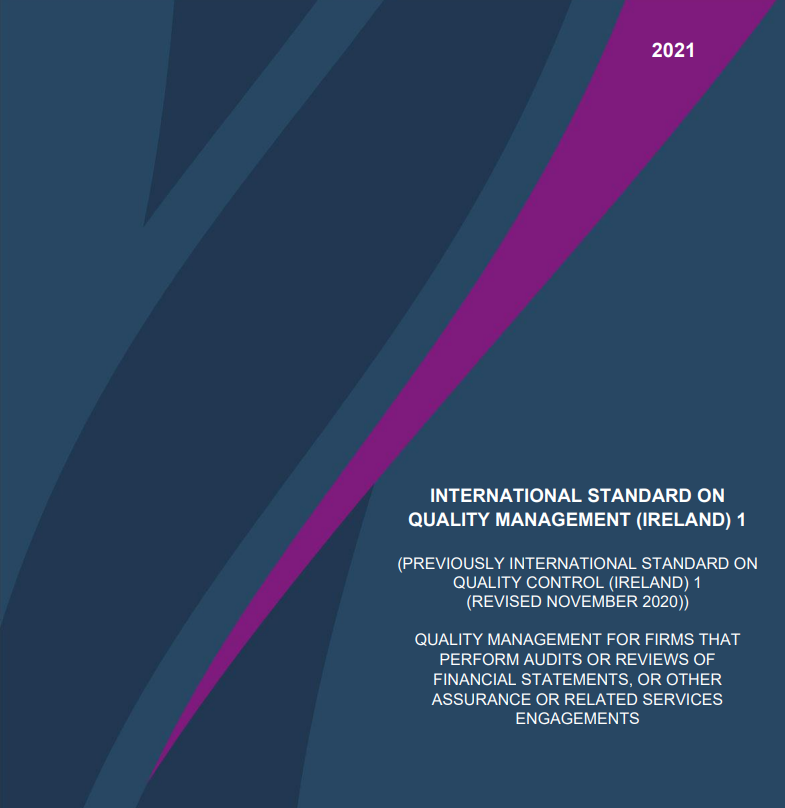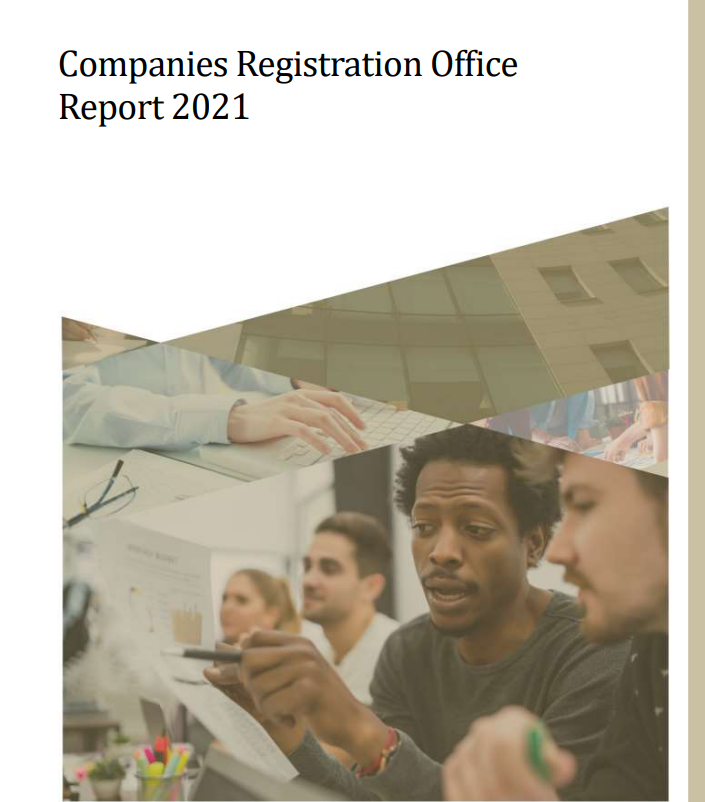
by John McCarthy Consulting Ltd. | Sep 19, 2022 | Blog, News
Around the globe, auditors are preparing for the imminent ISQM 1 regime, and it’s now just under three months to the deadline – 15 December 2022. On or before this date every Irish audit firm will need an ISQM-compliant System of Quality Management (‘SOQM’).
While larger firms have been working for many months to prepare for ISQM 1, we’re aware that many smaller firms are only just beginning the journey towards compliance and the last thing they might welcome is a reminder that time is running out!
Our new ISQM TOOLKIT is the answer to your needs and is available to purchase now for immediate download to help get you started. Click here for more details.
If you’re tempted to conclude that you’ve left it too late to meet the deadline, our message is: don’t despair. There is still opportunity to get ready, although it’ll mean setting aside dedicated partner time to achieve this, and regulators will be looking for clear evidence of progress by the end of the year and certainly by this time in 2023.
Here are our top ten tips to helping you get your SOQM across the finish line:
- Read the ISQM. There’s really no way around this! We’d recommend you also get hold of the IAASM Implementation Guide, which is genuinely helpful – although be warned; this is for the international version of the ISQM and doesn’t include the additional quality responses added to the Irish standard by the Irish Audit & Accounting Supervisory Authority (IAASA).
- Assess your current approach to audit quality. Firms aren’t (usually!) starting from scratch on audit quality and will have various policies and procedures already in place. While we want to stress that you shouldn’t simply ‘bolt on’ ISQM to your existing approach, it’s helpful to get a clear insight into what’s happening now (e.g., by taking a look with a critical eye at your existing ISQC 1 but being careful not to copy and paste the answers, but what’s in the ISQC1 may be helpful).This may mean gathering various documents (like staff appraisals, CPD plans and IES 8), clarifying existing arrangements with the rest of the team and organising your thoughts.
- Find out what your team thinks about your current approach. Chances are, you and your team already have sound insights into what’s working well and what isn’t, and some honest feedback may be painful but is essential to making progress.John McCarthy Consulting Ltd. (working in conjunction with our colleagues in Apex Professional Consulting Ltd.) has produced the ISQM TOOLKIT for the Republic of Ireland. It comes with a team questionnaire that can help you to gather anonymous feedback including suggestions for tackling problem areas.
- Start with leadership and governance issues. For most if not all small firms, a critical success factor for ISQM compliance is the degree of support from partners, especially managing partners within firms.Whether your firm is a sole practitioner or a larger firm, ISQM 1 challenges senior leadership to demonstrate genuine commitment to audit quality, recognising that this may not always align with a firm’s commercial strategy or its leaders’ priorities. You need to identify and deal with those conflicts, if present. You’ll also need to consider how much of the SOQM can be delegated to others and how the firm’s leadership will demonstrate that they bear ultimate responsibility for its success.
- Don’t dismiss the appointment stage. Many firms assign consideration of (re)appointment to junior audit staff who lack the judgement to assess ethical threats and to apply the right safeguards. Accepting a client relationship or engagement inappropriately removes any chance to achieve a quality audit.
- Be honest about priorities. Many firms say that they’re committed to audit quality, but a cursory scrutiny about how much of the firm’s time and money is spent in supporting and developing high quality audit may suggest otherwise.ISQM 1 demands that firms allocate enough resource to recruit and develop audit teams, supply them with appropriate tools (including hardware and software) and allow them the time to conduct audits thoroughly. You’ll also need to assess the quality risks of over-relying on external training providers, file reviewers or providers of methodology or IT tools.
- Refocus on prevention rather than cure. In the past, many audit firms have relied on regular cold file reviews to ensure their quality is up to scratch. Whilst such reviews will still play a key role, firms need to consider how to avoid audit defects altogether.For many audit partners, this may mean reducing the amount of time spent in review, and increasing the time spent in directing and supervising audits whilst in progress. Better prepared and managed teams should produce better audit files that need less review and remediation.
- Plan your monitoring as you go. As you set out your SOQM, make sure that every element is trackable and assign responsibility for monitoring to specific individuals, with clear instructions about how they should check progress and how they must record this. This should make the ‘monitoring and remediation’ part of the process much less burdensome.Don’t leave it all until the end!
- Get familiar with Root Cause Analysis (‘RCA’). This is a tool that has increased in profile of late, and while RCA can be sophisticated, it needn’t always be so. The aim is to identify systemic defects that, if corrected, will prevent problems from recurring. Don’t be afraid of asking ‘why did X happen’ multiple times when a quality problem is spotted, until the roots are uncovered.
- Consider external support. Whilst it’s possible to implement ISQM 1 without any other support, especially if you use a good transition tool (did we mention that John McCarthy Consulting Limited has designed the ISQM TOOLKIT with the smaller firm in mind?), you may find that getting the assistance of a specialist can be hugely valuable, even if just as a sounding board.
Many file reviewers are offering ISQM implementation help at the moment – why not ask your existing reviewer if they can help in this way?
If you need assistance with implementation, or have any questions please call John at 086 839 8360 or e-mail john@jmcc.ie.
The ISQM TOOLKIT is available here to purchase now for immediate download.

by John McCarthy Consulting Ltd. | Sep 11, 2022 | Blog, News
There are several new acronyms for auditors in Ireland to grapple with before Christmas. From 15 December 2022 the International Standard on Quality Management (ISQM) 1, issued by the Irish Audit & Accounting Supervisory Authority, comes into force. The ISQM TOOLKIT is available here to purchase now for immediate download.
It is and deals with the quality management of audits with special emphasis on:
- designing,
- implementing and
- operating
a system of quality management (SOQM) for audits or reviews of financial statements or other assurance or related services engagements.
It will have a deep and lasting impact on all audits carried out in Ireland, whether they are of public or private companies. Early preparation, well before 15 December 2022, is highly recommended.
The new standard requires audit firms to be much more proactive than the predecessor document the International Standard on Quality (ISQC) 1, which was more reactive in nature.
Among the changes in terminology and acronyms, the main ones are:
- IUR = Individual assigned with ultimate responsibility for implementation assigned ultimate responsibility and accountability for the system of quality management, on behalf of the firm, evaluates the system of quality management and concludes whether the system of quality management provides the firm with reasonable assurance that the objectives of the system are being achieved.
- IOR = Individual assigned with overall responsibility for the audit engagement – usually the engagement partner.
- SOQM = Systems of Quality Management is the overall description for the eight main areas prescribed by the standard.
- RCA = Root Cause Analysis – identification of the root causes of audit deficiencies which is an iterative and non-linear evaluation. It is part of the monitoring and remediation process – see below.
- EP = engagement partner.
- KAP = for an audit of financial statements, the engagement partner is the key audit partner.
The standard is broken into eight main areas:
- The firm’s risk assessment process;
- Governance and leadership;
- Relevant ethical requirements;
- Acceptance and continuance of client relationships and specific engagements;
- Engagement performance;
- Resources;
- Information and communication; and
- The monitoring and remediation process.
The IAASB in New York (from where the standard emanates) have issued a very useful Factsheet that explains the background to the changes.
Over the coming weeks we will publish a series of blogs, in advance of the publication of our new Audit Quality Control Manual called the ISQM Toolkit, to help auditors implement the new process. The Manual will be published soon. Watch this space!
Publications and AML webinar
- The ISQM TOOLKIT is available here to purchase now for immediate download.
- See our latest Anti-Money Laundering Policies Controls & Procedures Manual (March 2022) – View the Table of Contents click here.
- Also we have an updated AML webinar (March 2022) available here, which accompanies the AML Manual. It explains the current legal AML reporting position for accountancy firms and includes a quiz. Upon completion, you receive a CPD Certificate of attendance in your inbox.
- To ensure your letters of engagement and similar templates are up to date visit our site here where immediate downloads are available in Word format. A bulk discount is available for orders of five or more items if bought together.

by John McCarthy Consulting Ltd. | Sep 4, 2022 | Blog, News
The 2021 Annual Report of the Companies Registration Office (CRO) was published at the end of July 2022.
Here we summarise some of the more interesting statistics contained in the report. In the three statistics that we focus on here, 2017 was the record year out of the last five years for notices filed with the CRO for:
- Resignation of auditor, of which there were 3,216 resignations filed;
- Report that proper books not kept, of which there were 10 filed; and
- Removal of Auditor, of which there were 73 filed.
It shows that in the last five years, the numbers of:
- Resignations of auditors fell by 0.87% overall;
- Reports about companies not maintaining proper books of account/adequate accounting records fell from 10 reports per annum to zero in 2021; and
- Removals of auditors fell by almost 85% to a five year low of only 11 removals in the 2021 calendar year.
The full table is presented here:
| |
2017 |
2018 |
2019 |
2020 |
2021 |
| Resignation of auditor |
3,216 |
3,711 |
3,058 |
2,317 |
3,188 |
| Report that proper books not kept |
10 |
3 |
5 |
7 |
0 |
| Removal of Auditor |
73 |
33 |
31 |
13 |
11 |
The 2021 Annual Report of the CRO is available in pdf format here.
Are your AML Policies Controls & Procedures up to date?
We have just released our latest Anti-Money Laundering Policies Controls & Procedures Manual (March 2022) – View the Table of Contents click here.
We have also just released an updated AML webinar (March 2022) available here, which accompanies the AML Manual. It explains the current legal AML reporting position for accountancy firms.
To ensure your letters of engagement and similar templates are up to date visit our site here where immediate downloads are available in Word format. A bulk discount is available for orders of five or more items if bought together.
For our latest Audit Quality Control Manual (October 2021) (implementing the latest Irish Audit & Accounting Supervisory Authority standards including ISQC1 on audit quality control) click here. View the Table of Contents here.

by John McCarthy Consulting Ltd. | Aug 23, 2022 | Blog, News
Do you have clients with property interests in the UK, or who are about to acquire or recently sold property there? If you do, then you and your clients will need to know much more about a new piece of UK legislation designed to tackle money laundering.
With effect from 1 August 2022 any overseas entity that wants to buy, sell, or transfer property or land in the UK, (i.e. freehold estates or a lease granted for a term of more than seven years) must register with UK Companies House. They must declare who their registrable beneficial owners or managing officers are before 31 January 2023. Entities that disposed of property or land after 28 February 2022 will also need to register and give details of that disposal.
The Economic Crime (Transparency and Enforcement) Act 2022 provides the legislative background to this new requirement. This legislation creates the Register of Overseas Entities.
The procedure for making registration applications is set out in the Register of Overseas Entities (Delivery, Protection and Trust Services) Regulations 2022 and the rules around verification are contained in the Register of Overseas Entities (Verification and Provision of Information) Regulations 2022 (2022/725).
The requirements for registration apply to property acquired in:
- England and Wales, since 1 January 1999;
- Scotland, since 8 December 2014 and
- Northern Ireland, since 1 August 2022.
Overseas entities that currently hold qualifying property have six months from 1 August to register with Companies House. Failure to register is a criminal offence.
The Department for Business, Energy and Industrial Strategy (BEIS) has produced some guidance for those who may undertake verification on behalf of an overseas entity.
Accountants take care
According to the ICAEW and the UK Law Society, because of the potential liabilities for incorrectly carrying out verification checks, it is critical for any accountants seeking to carry out this service for a foreign entity that they fully understand that the client due diligence (CDD) process usually carried out to comply with anti-money laundering regulations is not of the same standard required for verification of ownership of Overseas Entities.
The BEIS guidance highlights that “there are differences between what’s required under the UK Money Laundering Regulations (MLRs) by way of client due diligence and what is required by way of verification under the 2022/725 Regulations. As such, a relevant person cannot only do what they would normally do under the MLRs and as set out in related industry guidance. Relevant persons should refer to the Act, the 2022/725 Regulations and this guidance when conducting verification checks.”
The ICAEW has said ‘If a professional accountant undertakes verification and does not carry out the process correctly, then they open themselves up to criminal prosecution, regulatory sanctions, and liability for professional negligence.’
Are your AML Policies Controls & Procedures up to date?
We have just released our latest Anti-Money Laundering Policies Controls & Procedures Manual (March 2022) – View the Table of Contents click here.
We have also just released an updated AML webinar (March 2022) available here, which accompanies the AML Manual. It explains the current legal AML reporting position for accountancy firms.
To ensure your letters of engagement and similar templates are up to date visit our site here where immediate downloads are available in Word format. A bulk discount is available for orders of five or more items if bought together.
For our latest Audit Quality Control Manual (October 2021) (implementing the latest Irish Audit & Accounting Supervisory Authority standards including ISQC1 on audit quality control) click here. View the Table of Contents here.
by John McCarthy Consulting Ltd. | Aug 10, 2022 | Blog, News
The Companies (Corporate Enforcement Authority) Act 2021 was commenced on 6 July 2022, apart from Section 35. One of the principal aims of the act was to allow for the set up of the Corporate Enforcement Authority that replaces the Office of the Director of Corporate Enforcement (ODCE).
Section 35 of the Companies (Corporate Enforcement Authority) Act 2021 amends the Companies Act 2014 by inserting a new section 888A.
This section requires a director to include their personal public service number (PPSN) in an application to:
- incorporate a company;
- file an annual return (B1) made by a company of which he or she is a director; and
- file a notice of change of directors or secretaries (B10) made by a company of which he or she is a director.
The Registrar of Companies shall determine the Director’s identity information to be provided where the director has no PPSN. Non-compliance will constitute a Category 4 offence.
It is expected that this section will commence in early 2023.
Are your AML Policies Controls & Procedures up to date?
We have just released our latest Anti-Money Laundering Policies Controls & Procedures Manual (March 2022) – View the Table of Contents click here.
We have also just released an updated AML webinar (March 2022) available here, which accompanies the AML Manual. It explains the current legal AML reporting position for accountancy firms.
To ensure your letters of engagement and similar templates are up to date visit our site here where immediate downloads are available in Word format. A bulk discount is available for orders of five or more items if bought together.
For our latest Audit Quality Control Manual (October 2021) (implementing the latest Irish Audit & Accounting Supervisory Authority standards including ISQC1 on audit quality control) click here. View the Table of Contents here.

by John McCarthy Consulting Ltd. | Jul 24, 2022 | Blog, News
According to the Financial Action Task Force (FATF) the definition of a Trust and Company Service Providers (TCSP) is a business, that provides any of the following services to third parties:
- Acting as a formation agent of legal persons Acting as (or arranging for another person to act as) a director or secretary of a company, a partner of a partnership, or a similar position in relation to other legal persons;
- Providing a registered office; business address or accommodation, correspondence or administrative address for a company, a partnership or any other legal person or arrangement;
- Acting as (or arranging for another person to act as) a trustee of an express trust or performing the equivalent function for another form of legal arrangement;
- Acting as (or arranging for another person to act as) a nominee shareholder for another person.[1]
The above FATF definition of a ‘TCSP’ excludes providers of TCSP services within financial institutions, law firms, notaries, other independent legal professionals and accountants, who will be separately regulated within their own professions.
The Criminal Justice (Money Laundering and Terrorist Financing) Acts 2010 to 2021 (the Act), requires TCSPs to help prevent money laundering or terrorist financing and register as designated persons with the AML Compliance Unit of the Department of Justice. They must also apply Customer Due Diligence (CDD) to all their transactions including the retention of certain customer identity documents, verify client data with the RBO register, maintain an AML Policies & Procedures Manual and provide staff with regular AML training.
There are currently around 380 TCSPs registered with the Department of Justice AML Compliance Unit and the latest list of registered TCSPs as of June 2022 may be viewed here.
[1] FATF ‘Guidance For A Risk-Based Approach for Trust and Company Service Providers’ (June 2019)
Are your AML Policies Controls & Procedures up to date?
We have just released our latest Anti-Money Laundering Policies Controls & Procedures Manual (March 2022) – View the Table of Contents click here.
We have also just released an updated AML webinar (March 2022) available here, which accompanies the AML Manual. It explains the current legal AML reporting position for accountancy firms.
To ensure your letters of engagement and similar templates are up to date visit our site here where immediate downloads are available in Word format. A bulk discount is available for orders of five or more items if bought together.
For our latest Audit Quality Control Manual (October 2021) (implementing the latest Irish Audit & Accounting Supervisory Authority standards including ISQC1 on audit quality control) click here. View the Table of Contents here.










